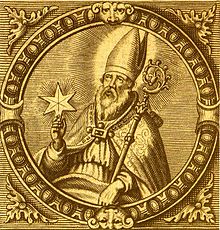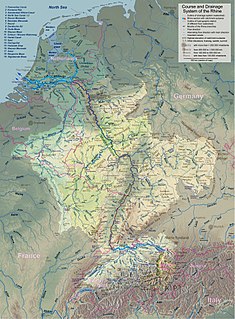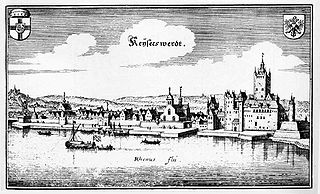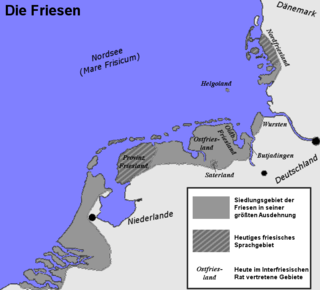
The Frisians are a Germanic ethnic group indigenous to the coastal parts of the Netherlands and northwestern Germany. They inhabit an area known as Frisia and are concentrated in the Dutch provinces of Friesland and Groningen and, in Germany, East Frisia and North Frisia. The Frisian languages are still spoken by more than 500,000 people; West Frisian is officially recognised in the Netherlands, and North Frisian and Saterland Frisian are recognised as regional languages in Germany.

Year 695 (DCXCV) was a common year starting on Friday of the Julian calendar. The denomination 695 for this year has been used since the early medieval period, when the Anno Domini calendar era became the prevalent method in Europe for naming years.

Willehad or Willihad ; c. 745 AD – 8 November 789) was a Christian missionary and the Bishop of Bremen from 787 AD.

The Archdiocese of Utrecht is an archdiocese of the Catholic Church in the Netherlands. The Archbishop of Utrecht is the Metropolitan of the Ecclesiastical province of Utrecht. There are six suffragan dioceses in the province: Breda, Groningen-Leeuwarden, Haarlem-Amsterdam, Roermond, Rotterdam, and 's-Hertogenbosch. The cathedral church of the archdiocese is Saint Catherine Cathedral which replaced the prior cathedral, Saint Martin Cathedral, after it was taken by Protestants in the Reformation.
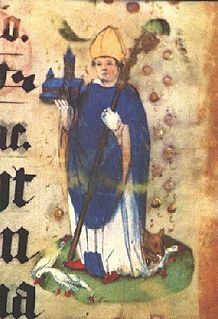
Saint Ludger was a missionary among the Frisians and Saxons, founder of Werden Abbey and first Bishop of Münster in Westphalia.

Lebuinus, Apostle of the Frisians and patron of Deventer.

The Two Ewalds were Saint Ewald the Black and Saint Ewald the Fair, martyrs in Old Saxony about 692. Both bore the same name, but were distinguished by the difference in the colour of their hair and complexions. They are now honored as saints in Westphalia.
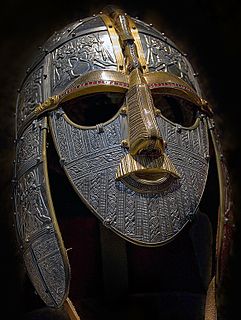
In the seventh century the pagan Anglo-Saxons were converted to Christianity mainly by missionaries sent from Rome. Irish missionaries from Iona, who were proponents of Insular Christianity, were influential in the conversion of Northumbria, but after the Synod of Whitby in 664 the English church gave its allegiance to the Pope.
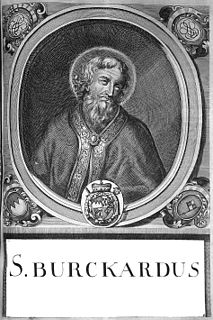
Burchard of Würzburg was an Anglo-Saxon missionary who became the first Bishop of Würzburg (741–754).
Rath Melsigi, Anglo-Saxon monastery in Ireland. A number of monks who studied there were active in the Anglo-Saxon mission on the continent. The monastery also developed a style of script that may have influenced the writers of the Book of Durrow.

The Frisian–Frankish wars were a series of conflicts between the Frankish Empire and the Frisian kingdom in the 7th and 8th centuries.

The Frisian Kingdom, also known as Magna Frisia, is a modern name for the Frisian realm in the period when it was at its largest (650-734). This empire was ruled by kings and emerged in the mid-7th century and probably ended with the Battle of the Boarn in 734 when the Frisians were defeated by the Frankish Empire. It lay mainly in what is now the Netherlands and – according to some 19th century authors – extended from the Zwin near Bruges in Belgium to the Weser in Germany. The center of power was the city of Utrecht. In medieval writings, the region is designated by the Latin term Frisia. There is a dispute among historians about the extent of this realm; There is no documentary evidence for the existence of a permanent central authority. Possibly Frisia consisted of multiple petty kingdoms, which transformed in time of war to a unit to resist invading powers, and then headed by an elected leader, the primus inter pares. It is possible that Redbad established an administrative unit. Among the Frisians at that time there was no feudal system.

Christianity in the 8th century was much affected by the rise of Islam in the Middle East. By the late 8th century, the Muslim empire had conquered all of Persia and parts of the Eastern Roman (Byzantine) territory including Egypt, Palestine, and Syria. Suddenly parts of the Christian world were under Muslim rule. Over the coming centuries the Muslim nations became some of the most powerful in the Mediterranean basin.
Tilmo, Irish missionary, fl. 690.
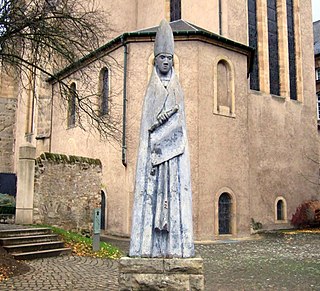
Wilgils of Ripon also known as Wilgisl and Hilgis was a seventh century saint and hermit of Anglo-Saxon England, who was the father of St Willibrord. His feast day is 31 January.
